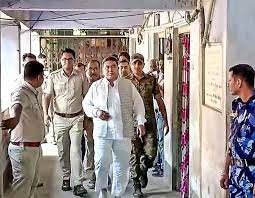In a significant development, the Supreme Court upheld the Calcutta High Court’s decision to transfer the investigation of the attack on Enforcement Directorate (ED) officials in Sandeshkhali, West Bengal, to the Central Bureau of Investigation (CBI). This decision marks a setback for the Mamata Banerjee-led Trinamool Congress (TMC) government, which had challenged the High Court’s order. The apex court also questioned the delay in the arrest of Sheikh Shahjahan, a local strongman and now-expelled TMC leader, in connection with the case.
The incident in question occurred on January 5 when a team of ED officials came under a violent mob attack while attempting to search properties linked to Sheikh Shahjahan on an island in Sandeshkhali. The Supreme Court bench, comprising Justice BR Gavai and Justice Sandeep Mehta, expressed concern over the delay in Shahjahan’s arrest, raising questions about the efficiency of the state’s law enforcement machinery.
Despite claims by the Bengal government that a high court order had temporarily halted the investigation, the Supreme Court was not convinced by the explanation provided by the state police. Senior advocate Jaideep Gupta, representing the Bengal government, argued that the arrest was delayed due to legal complexities arising from the court’s intervention. However, Additional Solicitor General SV Raju, representing the Centre, pointed out lapses on the part of the state police, alleging a lack of serious effort in apprehending Shahjahan.
The High Court’s scathing remarks on the Bengal police’s handling of the case further fueled the debate over the state’s role in the investigation. The court’s decision to expunge these observations underscores the contentious nature of the issue, with both sides vehemently defending their positions.
CBI’s further investigation
In a parallel development, the CBI has summoned nine individuals believed to be close aides and associates of Sheikh Shahjahan. The agency suspects their involvement in orchestrating the attack on the ED officials and instigating the mob violence. Sheikh, who is currently in CBI custody until March 14, faces scrutiny over his alleged role in the incident and other criminal activities, including land grab, extortion, and sexual harassment.
The transfer of the investigation to the CBI reflects growing concerns over the politicization of law enforcement in West Bengal. The clash between central agencies and the state government underscores broader tensions between political parties, with implications for the rule of law and governance in the region.
The Sandeshkhali incident has reignited debates over the autonomy of investigative agencies and the accountability of state governments in ensuring the safety and security of law enforcement officials. As the legal battle continues to unfold, the focus remains on achieving justice for the victims of the attack and restoring public trust in the impartiality of the judicial process.
In light of these developments, the Supreme Court’s verdict reaffirms the principle of judicial oversight and the need for a transparent and independent investigation into acts of violence and criminality, irrespective of political affiliations.













